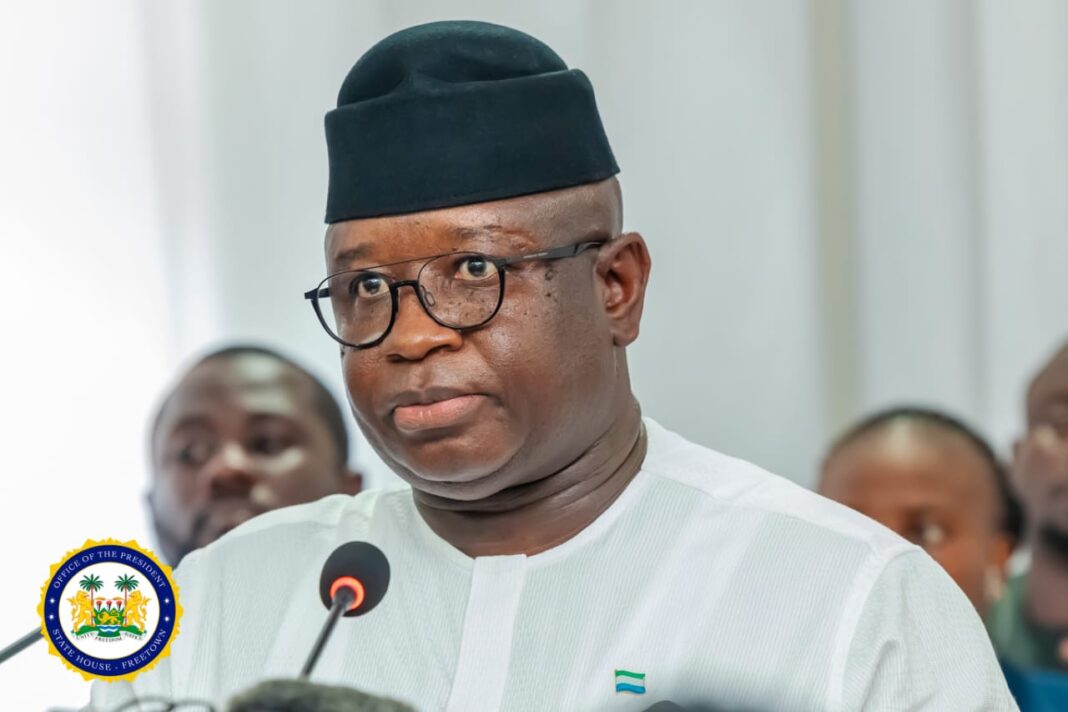Contrary to wide public expectations of a cut in public expenditure, the new government has created more ministries and agencies, bloated wage bill amid low revenue. The new ministries and agencies are mere addition that brings a heavy burden on the consolidated fund. It is worse at this moment than years gone by as the country is trapped in hard times.
Despite loud outcry about the economic meltdown, President Julius Maada Bio went ahead in having more offices than addressing the people’s needs. In all previous governments, Information and Communication Ministry was one superintended by one minister. Currently, the ministry has been divided into two led by two ministers.
The Information Ministry is different from the Communication Ministry meaning more expenditure for government. With the new arrangement, more personnel will have to be employed, trained and catered for. Where will the money come from at this moment?
Bio does not stop at the separation of ministries, but creation of new agencies. The Renewable Energy Agency led by Dr Kandeh Kolleh Yumkella is a new entity whose function is not yet clearly defined, but it deals a heavy blow on the public purse.
What Bio does today is a continuation of his first-term plans. Before 2018, Ministry of Education was a lone ministry supervised by one minister, but it is now a different case. Ministry of Basic and Senior School Education (MBSSE) is different from the Ministry of Technical and Higher Education (MTHE). The hitherto one ministry is now two separate institutions controlled by different ministers.
In the new dispensation, the distinction is not too relevant to national development since Free Education has stopped. It was clear in 2018 that the MBSSE came about to coordinate the free education project launched by government. In its pilot phase, everybody expected the project to continue after Bio’s first term as per arrangement.
When the project was originally floated, it was agreed that the international community will fund it for five years, and government later takes over and continues from where they stop.
The five years has come to an end, but government finds it difficult to fund the project with no tangible excuse. Parents will start to pay for their sons and daughters this September when schools re-open.
In the face of a strained relationship between Bio’s government and international community, hope of getting loans is faint let alone grants to fund the free education scheme. Why also do we need an MTHE when one minister can take care of the two ministries.
What is also new about higher education in Sierra Leone when none of the country’s universities is mentioned in the world’s latest ranking of higher institutions. What is also technical about Sierra Leone’s education when the country’s engineers cannot fix any road, and medical doctors cannot take care of several illnesses.
With such a weak system, few privileged Sierra Leoneans make their way to European and few African countries to take care of their health problems with the West African country of Ghana hosting most of Sierra Leonean patients.
How many innovations have government sponsored since the MTHE was set up?
The answer is left to government’s performance record in the first five years. Almost invariably, Ministry of Social Welfare, Gender and Children’s Affairs (MSWGCA) which was one ministry is now divided into two: the Social Welfare Ministry is different from the Children’s Affairs Ministry which also means a burden on government.
One would also like to question the significance of the division since the reality is sad, bizzare and ridiculous.
Has the division positively impacted on domestic violence issues? To what extent has the separation resisted sexual violence in the country? What is new about addressing social welfare issues. Without hesitation, the responses to these questions are in the negative as situation remains the same in the face of separation. Embarking on similar moves, the Ministry of Agriculture, Forestry and the Environment has been cut into two as Sierra Leone now has an Agriculture Ministry separate from the Environment Ministry, and questions about such move also linger. What has changed in food sufficiency since the division? What new environment protection strategies that have been adopted by this government? Have government stopped recurrent floodings?
The answers are also the same with the same old problems. Since these divisions and separations create no impact, one could safely argue that government’s move is just to misuse public money as more employees have to be taken care of. What is dangerous for the economy is the appalling mismatch between government’s high financial burden and the low revenue base.
At the moment, the international community have turned their backs against the Bio regime which they referred to as “an illegitimate government.”
All funds have been withheld until genuine results are announced. Locally, Bio cannot make much owing to an abnormal economic situation. Most shops and other businesses do not open owing to fear of strikes and demonstrations. Without any figment of the imagination, Sierra Leone sits on the keg of a dynamite ready to explode at anytime or the country can economically implode on its own if measures for good governance are not taken.
No one talks about money and business where is no security and freedom, so government’s move is all about wastages. Although president Julius Maada Bio is yet to be recognised, probably his sound policies on the economy might endear him a bit to the international community. The Guinean leader, Colonel Mahmady Dumbuya is a typical example.
He came to power through a coup d’etat but he earned some international recognition owing to policy effectiveness. He has brought sound economic reforms that better the lives of many Guineans with a clean human rights record. Bio must therefore lend a leaf from Doumbouya’s book if he is to sail through troubled waters.


